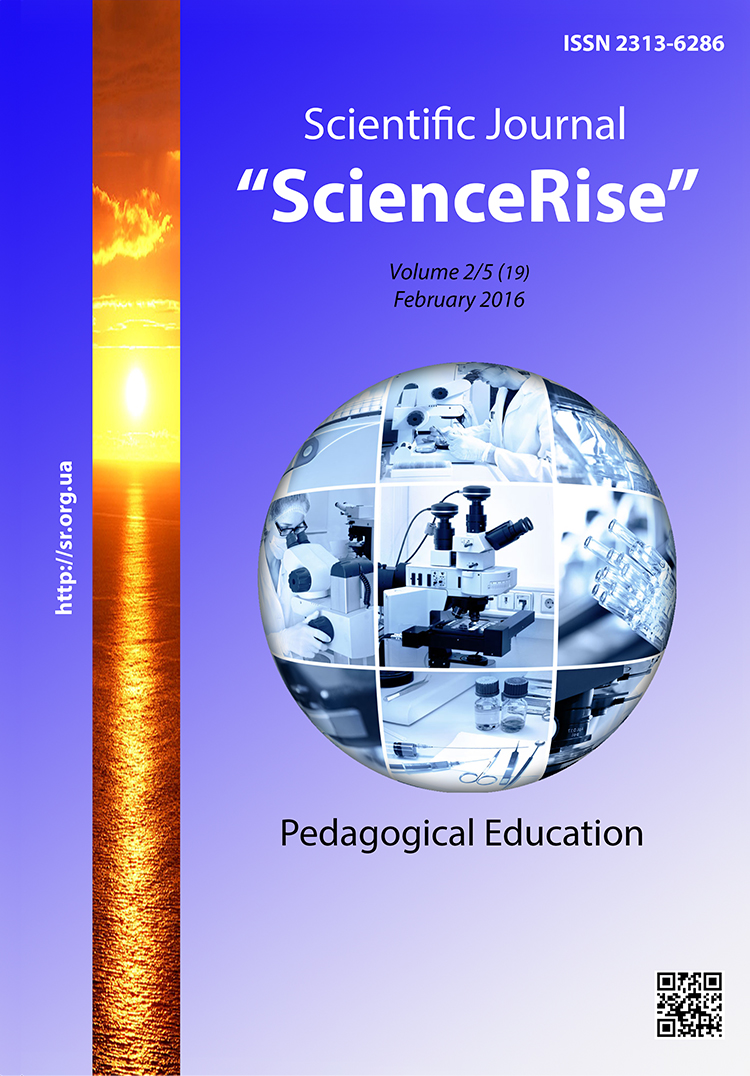Organizational and pedagogical conditions of social workers professional self-improvement in the resource centers (according to the results of experimental study)
DOI:
https://doi.org/10.15587/2313-8416.2016.60561Keywords:
organizational and pedagogical conditions of professional self-improvement, professional self-improvement, resource centerAbstract
In the article was defined the notion “organizational and pedagogical conditions of social workers professional self-improvement in resource centers”. During the study there was defined and experimentally verified the next organizational and pedagogical conditions of the social workers self-improvement in resource centers: taking into account informative and methodological needs of social workers; favoring the partner interaction of social workers with representatives of the state and non-governmental organizations; methodical supporting the social workers in resource centers of the social-workers professional self-improvement. There was defined the task of the experimental program and carried out an approbation of the results of researches that were qualitatively and quantitatively analyzed. After experiment the positive changes in attitude to the use of resource center services for attaining professional self-improvement took place in experimental groups and so far as in the control groups these shifts are statistically unchangeable it indicates an effectiveness of introduced organizational and pedagogical conditions for social workers self-improvement in resource centers. There was observed the growth of motivation of the participants of experiment such as forming and strengthening the positive position toward professional activity and resource centers functioning; respondents demonstrated an increase of the level of awareness about the current programs of centers; expressed an interest and took active participation in the planning of resource centers programs, monitoring studies for clarification of the informative and methodological needs of users and so on. The results of experiments testify to the positive dynamics in all three components of the professional self-improvement of social workers as users of resource centers namely: motivational one, cognitive one and operational one
References
Tymoshenko, N. (2016). Professional self social teacher. Kyiv: Kyiv. University of Borys Grinchenko, 128.
Kosholap, A. (2009). Pedagogical conditions of preparation of future teachers of physical self. Vinnitsa, 182.
Sklyarenko, I. (2009). Professional self-improvement in the preparation of future teachers of music. Kyiv, 243.
Myhovych, I., Zhmyr, V. (2004). Formation of training and social workers: experience, problems. Social Work in Ukraine: Theory and Practice, 2, 122–131.
Lyakh, T.; Bezpalko, O., Basyuk, T., Bondarenko, Z. et. al; Bezpal'ko, O. V. (Ed.) (2007). Аctivities and resource information and consultancy centers. Improving social services for children and families in the community, summarizing the experience of the project. Kyiv: Science. World, 144.
Trotsenko, N. (2012). Professional self-development of social workers in the resource centers, 20.
Serhiyenko, N. (2010). Оrganizational and pedagogical conditions of professional competence of teachers of secondary schools. Theory and methods of management education, 3, 3–11.
Polozenko, O. (2003). Organizational-methodical conditions of improving teaching senior teacher of the agricultural school. Ternopol, 20.
Trotsenko, N. (2012). Professional self-development of social workers in the resource centers. Kyiv, 243.
Trotsenko, N.; Lokaryeva, G. (Ed.) (2011). Social partnership as one of the pedagogical conditions of professional self-help social workers in resource centers. Bulletin of Zaporizhzhya National University: teaching science, 3 (16), 169–174.
Downloads
Published
Issue
Section
License
Copyright (c) 2016 Наталія Євгенівна Тимошенко

This work is licensed under a Creative Commons Attribution 4.0 International License.
Our journal abides by the Creative Commons CC BY copyright rights and permissions for open access journals.
Authors, who are published in this journal, agree to the following conditions:
1. The authors reserve the right to authorship of the work and pass the first publication right of this work to the journal under the terms of a Creative Commons CC BY, which allows others to freely distribute the published research with the obligatory reference to the authors of the original work and the first publication of the work in this journal.
2. The authors have the right to conclude separate supplement agreements that relate to non-exclusive work distribution in the form in which it has been published by the journal (for example, to upload the work to the online storage of the journal or publish it as part of a monograph), provided that the reference to the first publication of the work in this journal is included.

